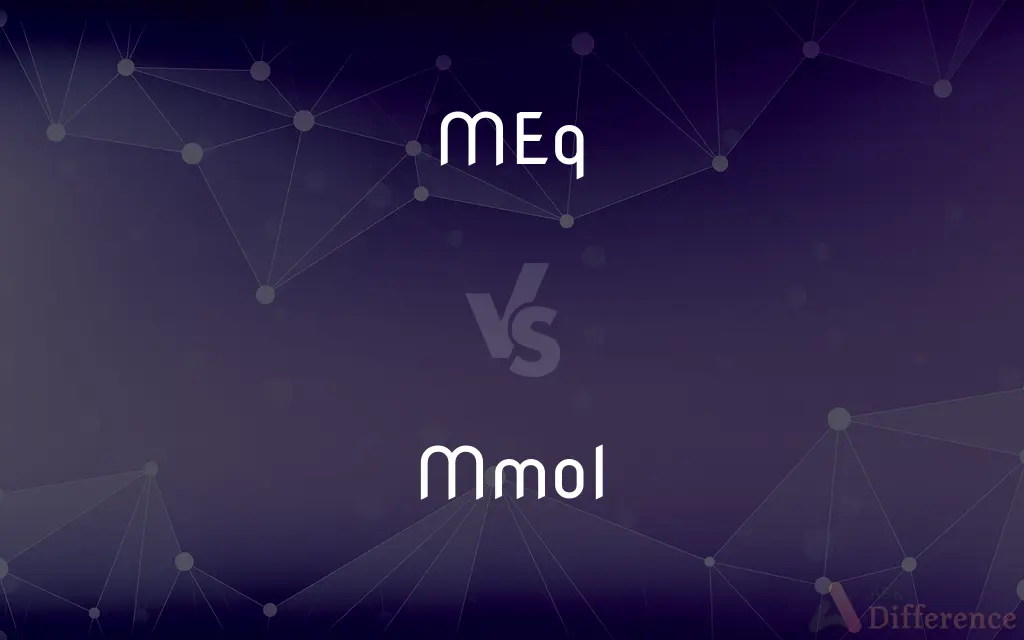MEq vs. Mmol — What's the Difference?
By Tayyaba Rehman — Published on December 25, 2023
MEq measures the quantity of charge in electrolytes, while Mmol measures the amount of substance. Both units express concentration but factor in charge and substance respectively.

Difference Between MEq and Mmol
Table of Contents
ADVERTISEMENT
Key Differences
Context of Use: MEq, or milliequivalent, is a unit typically used in the realm of medicine and biology to express the concentration of electrolytes in a solution. It takes into account the charge of the ion. Mmol, or millimole, is a more general unit used across sciences, primarily in chemistry, to represent the amount of a substance, without considering its charge.
Nature of Measurement: MEq provides a perspective on the number of charges an ion contributes in a solution. When dealing with electrolytes, the charge is crucial, and MEq helps capture that. Mmol, meanwhile, represents the amount of substance, measuring entities like atoms, molecules, or ions without charge considerations.
Chemical Equivalence: The term "equivalent" in MEq points to the idea of chemical equivalence, which means it relates to how much of one substance will react with a given amount of another. Mmol, on the other hand, is more about quantifying the substance in terms of its molecular or atomic count.
Calculation Differences: To obtain the MEq of a substance, one would divide the milligrams of the substance by its milligram-equivalent weight. In contrast, to get the Mmol of a substance, one would divide the milligrams of the substance by its molecular weight (in milligrams per mole).
Applications: While both MEq and Mmol are units expressing concentration, their use cases differ. MEq finds its primary application in healthcare, where electrolyte balance in patients is crucial. Mmol is broader in application, being used in various chemical and biological contexts to represent substance quantity.
ADVERTISEMENT
Comparison Chart
What it Represents
Quantity of charge in electrolytes.
Amount of substance.
Field of Common Use
Medicine and Biology.
Chemistry and Biology.
Factors in
Charge of the ion.
Number of entities (like atoms or molecules).
Based on
Chemical equivalence.
Molecular or atomic count.
Calculation Method
Milligrams divided by milligram-equivalent weight.
Milligrams divided by molecular weight.
Compare with Definitions
MEq
Represents the number of milligrams per equivalent weight of a substance.
When assessing potassium levels in patients, doctors rely on values presented in MEq.
Mmol
Reflects the number of milligrams per molecular weight of a substance.
When determining the amount of a reactant needed, chemists might calculate in Mmol.
MEq
A unit measuring the concentration of electrolytes in a solution based on charge.
Sodium levels in blood are often reported in MEq to reflect its ionic charge.
Mmol
A unit representing a thousandth of a mole of a substance.
Glucose levels in blood are commonly reported in Mmol per liter.
MEq
An analytical unit to gauge the amount of reactiveness of ions in medical contexts.
Assessing acid-base balance in the body often involves measurements in MEq.
Mmol
A standard unit in chemistry measuring substance concentration without charge considerations.
The concentration of a solute in a solution is often given in Mmol.
MEq
Expresses chemical equivalence in solution, factoring in ionic charge.
In intravenous fluids, the balance of electrolytes like chloride is given in MEq.
Mmol
Used broadly in science to denote the quantity of substance in specific contexts.
The active ingredient in a drug might be quantified in Mmol to ensure proper dosage.
MEq
Used to depict the concentration of charged particles in biological systems.
Monitoring calcium in the body often involves measurements in MEq to capture its double positive charge.
Mmol
Quantifies substance amount in terms of entities like atoms or molecules.
In chemical reactions, reactant quantities might be given in Mmol.
MEq
One-thousandth of an equivalent
Mmol
Abbreviation of millimole
Common Curiosities
Can Mmol be used across various scientific domains?
Yes, Mmol is a general unit used across sciences to represent substance quantity.
Why is MEq crucial in healthcare?
It helps monitor and manage electrolyte balance in patients.
Can both MEq and Mmol be used interchangeably?
No, they measure different aspects (charge vs. substance quantity).
In which field is MEq primarily used?
MEq is predominantly used in medicine and biology to assess electrolyte concentrations.
How is Mmol calculated for a substance?
Divide the milligrams of the substance by its molecular weight.
What does MEq focus on when measuring concentration?
MEq measures the quantity of charge in electrolytes in a solution.
What does Mmol indicate in a blood test?
It typically denotes the concentration of a substance, like glucose.
Is MEq always a larger value than Mmol for the same substance?
Not necessarily. It depends on the charge of the ion in consideration.
Is Mmol specific to charged particles?
No, Mmol measures the amount of substance without considering its charge.
Does MEq account for the reactivity of ions?
Yes, it relates to how much of one substance will react with another.
What's the significance of the term "equivalent" in MEq?
It points to the idea of chemical equivalence, considering how substances react with each other.
Are MEq and Mmol both measures of concentration?
Yes, but MEq focuses on charge and Mmol on the amount of substance.
Why might chemists prefer Mmol over MEq?
Mmol offers a straightforward measure of substance quantity without charge considerations.
In what unit are blood sodium levels typically reported?
They are often reported in MEq.
Can MEq values be converted to Mmol?
Yes, but the conversion requires knowledge of the ion's valence.
Share Your Discovery

Previous Comparison
IBM vs. Accenture
Next Comparison
Sourcing vs. ProcurementAuthor Spotlight
Written by
Tayyaba RehmanTayyaba Rehman is a distinguished writer, currently serving as a primary contributor to askdifference.com. As a researcher in semantics and etymology, Tayyaba's passion for the complexity of languages and their distinctions has found a perfect home on the platform. Tayyaba delves into the intricacies of language, distinguishing between commonly confused words and phrases, thereby providing clarity for readers worldwide.











































